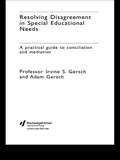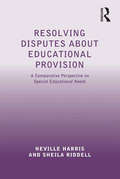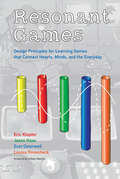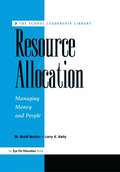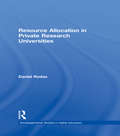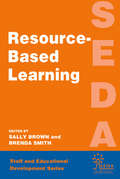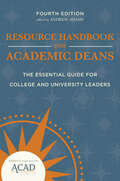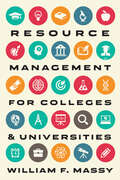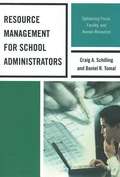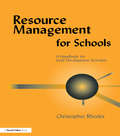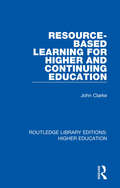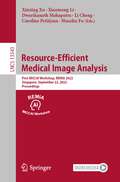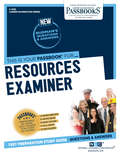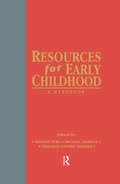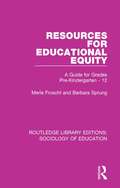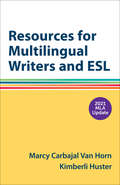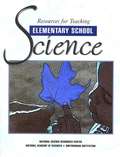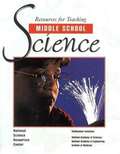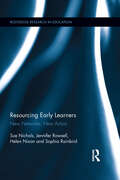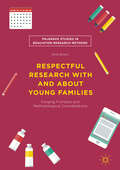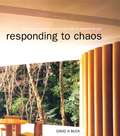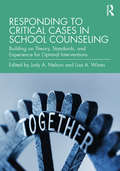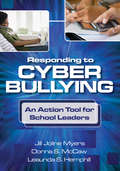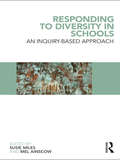- Table View
- List View
Resolving Disagreement in Special Educational Needs: A Practical Guide to Conciliation and Mediation
by Irvine S. Gersch Adam Gersch Adam Gersch NfaLocal Education Authorities are now obliged to put in place arrangements to try to settle disagreements over the provision for children with special educational needs. This practical book aims to help those charged with making these arrangements and those directly involved in the conciliation and mediation process.While there is no 'right way' to resolve disputes of this kind, the ultimate goal must be to reach a positive conclusion as quickly as possible for the benefit of the child involved. In this book, the authors look at a range of approaches and issues to achieve this such as:*how to plan disagreement resolution*skills and techniques for mediation*tools for training and self-assessment*the SEN tribunal*ethical and legal issues.The book includes contributions from leading practitioners in special educational needs, law, mediation and conciliation. It is the ideal handbook for all those working in the area of special education needs, both in schools and for LEAs and other agencies.
Resolving Disputes about Educational Provision: A Comparative Perspective on Special Educational Needs
by Sheila Riddell Neville HarrisWith contributions by recognised experts in the field of education law, this book is a comparative study of the resolution of special education disputes, including via mediation. It analyses the varying approaches in England, Scotland, the US and the Netherlands and addresses major questions of dispute resolution, redress, judicial and non-judicial approaches and the protection of citizens' rights. The first review of mediation in citizen v. state disputes outside the context of the courts, this topical book also incorporates findings from a recent ESRC study into dispute resolution in special educational needs cases. It will not only be of interest to those concerned with education issues but also those interested in administrative justice, especially the role of mediation generally
Resonant Games: Design Principles for Learning Games that Connect Hearts, Minds, and the Everyday (Digital Media and Learning)
by Eric Klopfer Jason Haas Scot Osterweil Louisa RosenheckPrinciples for designing educational games that integrate content and play and create learning experiences connecting to many areas of learners' lives. Too often educational videogames are narrowly focused on specific learning outcomes dictated by school curricula and fail to engage young learners. This book suggests another approach, offering a guide to designing games that integrates content and play and creates learning experiences that connect to many areas of learners' lives. These games are not gamified workbooks but are embedded in a long-form experience of exploration, discovery, and collaboration that takes into consideration the learning environment. Resonant Games describes twenty essential principles for designing games that offer this kind of deeper learning experience, presenting them in connection with five games or collections of games developed at MIT's educational game research lab, the Education Arcade.Each of the games—which range from Vanished, an alternate reality game for middle schoolers promoting STEM careers, to Ubiquitous Bio, a series of casual mobile games for high school biology students—has a different story, but all spring from these fundamental assumptions: honor the whole learner, as a full human being, not an empty vessel awaiting a fill-up; honor the sociality of learning and play; honor a deep connection between the content and the game; and honor the learning context—most often the public school classroom, but also beyond the classroom.
Resource Allocation
by Scott, M Norton Larry KellyThis book shows you how your school can maintain its high standards despite financial obstacles. It shows you how to investigate various types and sources of money available to your school; monitor the use of scarce school resources; develop a school improvement plan which incorporates financial needs; and recruit, assign, and develop teachers and staff for maximum effectiveness.
Resource Allocation in Private Research Universities (RoutledgeFalmer Studies in Higher Education)
by Daniel RodasThis book explores the resource allocation process in contemporary private research universities through six richly detailed case studies. It includes an extensive discussion of historical approaches to university resource allocation. The cases are based on in-depth interviews with university presidents, provosts, deans financial officers, and department chairs. The evolution of university resource allocation systems is discussed in relation to institutional history, mission, culture, priorities, leadership, and prevailing financial condition.
Resource Based Learning (SEDA Series)
by Brenda Smith Sally BrownResource-based learning has emerged as a response to the changing expectations of students. This text provides strategies for its implementation, development evaluation and discusses the implications for resource centres.
Resource Handbook for Academic Deans: The Essential Guide for College and University Leaders
by Andrew AdamsThis essential guide addresses the expanding, multifaceted role of college and university academic leaders.The new edition of the Resource Handbook for Academic Deans, one of the most important offerings to the academic community by the American Conference of Academic Deans, is written by and for academic leaders to address the expanding, multifaceted role of college and university administrators. Each chapter explores a topic related to how higher education leaders are influenced by national events, local partnerships, or on-campus collaborations. Among the topics covered are:• understanding educational policy at the national level• working with leaders from department heads to provosts• engaging with external partners• leading collaborative change at small colleges and universities• shifting toward student-centered campuses• making data-informed decisions• embracing diversity, equity, and inclusion• managing and balancing salaries • building effective leadership teams and mentoring future leaders• holding difficult conversations• returning to the faculty after leadershipProviding helpful advice that can be studied in short chapters and inspiring content based on personal experience, the forty-three authors in this volume hold positions from department chairs to presidents at four-year and community colleges across the country. Written during the COVID-19 pandemic and amid calls for greater diversity, equity, and inclusion in higher education, each chapter offers perceptive insights from experienced leaders who serve a broad range of institutional types.
Resource Management for Colleges and Universities
by William F. MassyHow comprehensive activity-based models can help university leaders and faculty reshape their institutions through better resource management.Resources in higher education steer colleges and universities both strategically and tactically. They drive incentives and accountability for faculty and staff while providing academics with the infrastructure they need in order to perform effectively. But while American colleges and universities remain the gold standard for worldwide higher education, Resource Management for Colleges and Universities argues that their decision-making cultures and business models are beset by serious flaws. In this audacious book, William F. Massy writes that resource allocation in colleges and universities needs to become more responsive to academic mission, marketplace realities, and the requirements of financial sustainability. Such improvement is needed, he asserts, because few institutions currently have the evidence, know-how, and cultural capacity to take advantage of modern information systems and models. Luckily, today's academic resourcing models enable academic leaders and faculty to close the gaps and do a significantly better job of controlling costs and improving academic performance. Massy describes three kinds of contemporary, comprehensive AR models: internal economic, external economic, and mission-market-margin. He explains how these models, if used correctly, support mission-critical academic decisions and reveals why they are game-changers for college and university management. Describing how real universities are using these models to understand their teaching and research revenues and costs and to predict changes needed in budget planning, Massy also provides numerous insights about how academic organizations function and how they can be induced to adopt needed changes. Building on Reengineering the University, Massy's earlier book, Resource Management for Colleges and Universities will provide readers with the wherewithal, and the motivation, to fundamentally transform their institutions.
Resource Management for School Administrators: Optimizing Fiscal, Facility, and Human Resources
by Daniel R. Tomal Craig A. SchillingResource Management for School Administrators is the only comprehensive book covering all school resources---fiscal, facilities and human resources. Each chapter has objectives that are aligned with the new ELCC and ISLCC standards on accreditation. Many of the federal and various state policies and laws are included. Everything you need to know on managing school resources are covered: national and state perspectives, future challenges to funding public education, resource allocation, developing a school district budget, sources of revenue, accounting budgeting and reporting, financial statements, allocating resource for higher student performance, human resource, laws and policies, compensation, facilities and auxiliary services and safety and security <P><P>Each chapter contains a comprehensive case study and exercises for easy application. This practical book will be useful to all school leaders who are trying to improve their school resource management.
Resource Management for Schools: A Handbook of Staff Development Activities
by Christopher RhodesNational Standards put forward by the Teacher Training Agency serve to emphasize the importance of good resource management within schools. National Standards put forward by the Teacher Training Agency serve to emphasize the importance of good resource management within schools. This book, contains essential factual material, provides a wide range of professional development activities to support schools in their own improvement journey, aims to provide new opportunities for teachers and management to reflect critically on and improve teacher and pupil autonomy, and shows how the benefits of resource management can make an impact on pupils' classroom experience.
Resource-Based Learning for Higher and Continuing Education (Routledge Library Editions: Higher Education #3)
by John ClarkeOriginally published in 1982 Resource-Based Learning for Higher and Continuing Education was written with the needs in mind of educationists who are responsible for the support of resource-based learning in higher and continuing education. The rationale for this mode of learning is explored and the implications for an institution seeking to provide teaching and learning resources which may well be used by an individual student. To place the reviews of the techniques that follow into a working context, a brief case-history of the Dundee College of Education Learning Resources Project, a major implementation of resource based learning in higher education is presented. The accent throughout the book is on the practical aspects of resource provision. Special attention is given to the problems inherent in the initial preparation by teaching staff of such items as manuscripts for printed works and shooting scripts for visual materials. Economic methods of production and reliable and effective means of presentation for audio-visual materials are also considered, both for use within institutions as well as by home-based students.
Resource-Efficient Medical Image Analysis: First MICCAI Workshop, REMIA 2022, Singapore, September 22, 2022, Proceedings (Lecture Notes in Computer Science #13543)
by Li Cheng Huazhu Fu Xinxing Xu Xiaomeng Li Dwarikanath Mahapatra Caroline PetitjeanThis book constitutes the refereed proceedings of the first MICCAI Workshop on Resource-Efficient Medical Image Analysis, REMIA 2022, held in conjunction with MICCAI 2022, in September 2022 as a hybrid event. REMIA 2022 accepted 13 papers from the 19 submissions received. The workshop aims at creating a discussion on the issues for practical applications of medical imaging systems with data, label and hardware limitations.
Resources Examiner: Passbooks Study Guide (Career Examination Series)
by National Learning CorporationThe Resources Examiner Passbook® prepares you for your test by allowing you to take practice exams in the subjects you need to study. It provides hundreds of questions and answers in the areas that will likely be covered on your upcoming exam.
Resources for Early Childhood: A Handbook
by Hannah Nuba Deborah Lovitky Sheiman Michael SearsonPublished under the auspices of the New York Public Library, this expanded, reorganized and updated edition of Resources for Early Childhood: An Annotated Guide for Educators, Librarians, Health Care Professionals, and Parents (1985), includes new essays by the most important theorists in the early childhood field today. Influential classic works as well as recent works are listed and annotated in the new bibliographies. Essayists include Marian Wright Edelman on the hardships of America's young families; Bettye Caldwell on Educare; Lewis Lipsitt on assessment of deficits in children; Louise Bates Ames on developmental readiness for schooling; Nicholas Anastasiow on oral language development; Urie Bronfenbrenner on changes in family life and child care; Irving Lazar on education policy; Bob McGrath on recorded children's music; Michael Lewis on emotional development in preschool children; Michael Meyerhoff on toy selection; David Elkind on young children in the post-modern world; Mary Dean Dumais on the kindergarten curriculum; Vincent Fontana on child abuse; Dorothy Singer on television and children's overall development; Lendon Smith on nutrition, health, AIDS and the environment; Edward Zigler on family support programs; Stella Chess on temperament; Bernard Spodek on choosing appropriate early childhood programs; David Weikart on the importance of early childhood education. A subject index is included.
Resources for Educational Equity: A Guide for Grades Pre-Kindergarten - 12 (Routledge Library Editions: Sociology of Education #25)
by Barbara Sprung Merle FroschlThis title, first published in 1988, provides a comprehensive compilation of resources to help teachers and policy makers locate the materials they need to create equitable curriculum and classroom environments. While its primary focus is on girls and women, Resources for Educational Equity takes a comprehensive approach to equity encompassing concerns of gender, race, and disability. This title will be of interest to both students of education and to educators.
Resources for Multilingual Writers and ESL with 2021 MLA Update: A Hacker Handbooks Supplement
by Diana Hacker Nancy Sommers Kimberli Huster Marcy Carbajal Van HornThis ebook has been updated to provide you with the latest guidance on documenting sources in MLA style and follows the guidelines set forth in the MLA Handbook, 9th edition (April 2021).This supplement both resident and international students understand college expectations and develop strategies for improving their academic English and academic writing. Written by an ESL expert, Resources for Multilingual Writers and ESL includes plenty of helpful charts, activities, exercises, and model papers — along with notes about where to find additional resources online and on campus.
Resources for Teaching Elementary School Science
by National Science Resources Center Staff National Academy of Sciences Staff Smithsonian Institution StaffWhat activities might a teacher use to help children explore the life cycle of butterflies? What does a science teacher need to conduct a "leaf safari" for students? Where can children safely enjoy hands-on experience with life in an estuary? Selecting resources to teach elementary school science can be confusing and difficult, but few decisions have greater impact on the effectiveness of science teaching.Educators will find a wealth of information and expert guidance to meet this need in Resources for Teaching Elementary School Science. A completely revised edition of the best-selling resource guide Science for Children: Resources for Teachers, this new book is an annotated guide to hands-on, inquiry-centered curriculum materials and sources of help in teaching science from kindergarten through sixth grade. (Companion volumes for middle and high school are planned.)The guide annotates about 350 curriculum packages, describing the activities involved and what students learn. Each annotation lists recommended grade levels, accompanying materials and kits or suggested equipment, and ordering information.These 400 entries were reviewed by both educators and scientists to ensure that they are accurate and current and offer students the opportunity to: Ask questions and find their own answers. Experiment productively. Develop patience, persistence, and confidence in their own ability to solve real problems. The entries in the curriculum section are grouped by scientific area--Life Science, Earth Science, Physical Science, and Multidisciplinary and Applied Science--and by type--core materials, supplementary materials, and science activity books. Additionally, a section of references for teachers provides annotated listings of books about science and teaching, directories and guides to science trade books, and magazines that will help teachers enhance their students' science education.Resources for Teaching Elementary School Science also lists by region and state about 600 science centers, museums, and zoos where teachers can take students for interactive science experiences. Annotations highlight almost 300 facilities that make significant efforts to help teachers.Another section describes more than 100 organizations from which teachers can obtain more resources. And a section on publishers and suppliers give names and addresses of sources for materials.The guide will be invaluable to teachers, principals, administrators, teacher trainers, science curriculum specialists, and advocates of hands-on science teaching, and it will be of interest to parent-teacher organizations and parents.
Resources for Teaching Middle School Science
by National Science Resources CenterWith age-appropriate, inquiry-centered curriculum materials and sound teaching practices, middle school science can capture the interest and energy of adolescent students and expand their understanding of the world around them.Resources for Teaching Middle School Science, developed by the National Science Resources Center (NSRC), is a valuable tool for identifying and selecting effective science curriculum materials that will engage students in grades 6 through 8. The volume describes more than 400 curriculum titles that are aligned with the National Science Education Standards.This completely new guide follows on the success of Resources for Teaching Elementary School Science, the first in the NSRC series of annotated guides to hands-on, inquiry-centered curriculum materials and other resources for science teachers.The curriculum materials in the new guide are grouped in five chapters by scientific area--Physical Science, Life Science, Environmental Science, Earth and Space Science, and Multidisciplinary and Applied Science. They are also grouped by type--core materials, supplementary units, and science activity books.Each annotation of curriculum material includes a recommended grade level, a description of the activities involved and of what students can be expected to learn, a list of accompanying materials, a reading level, and ordering information.The curriculum materials included in this book were selected by panels of teachers and scientists using evaluation criteria developed for the guide. The criteria reflect and incorporate goals and principles of the National Science Education Standards. The annotations designate the specific content standards on which these curriculum pieces focus.In addition to the curriculum chapters, the guide contains six chapters of diverse resources that are directly relevant to middle school science. Among these is a chapter on educational software and multimedia programs, chapters on books about science and teaching, directories and guides to science trade books, and periodicals for teachers and students.Another section features institutional resources. One chapter lists about 600 science centers, museums, and zoos where teachers can take middle school students for interactive science experiences. Another chapter describes nearly 140 professional associations and U.S. government agencies that offer resources and assistance.Authoritative, extensive, and thoroughly indexed--and the only guide of its kind--Resources for Teaching Middle School Science will be the most used book on the shelf for science teachers, school administrators, teacher trainers, science curriculum specialists, advocates of hands-on science teaching, and concerned parents.
Resourcing Early Learners: New Networks, New Actors (Routledge Research in Education)
by Jennifer Rowsell Sue Nichols Helen Nixon Sophia RainbirdThe landscape of early childhood education and care is changing. Governments world-wide are assuming increasing authority in relation to child-rearing in the years before school entry, beyond the traditional role in assisting parents to do the best they can by their children. As part of a social agenda aimed at forming citizens well prepared to play an active part in a globalised knowledge economy, the idea of ‘early learning’ expresses the necessity of engaging caregivers right from the start of children’s lives. Nichols, Rowsell, Rainbird, and Nixon investigate this trend over three years, in two countries, and three contrasting regions, by setting themselves the task of tracing every service and agent offering resources under the banner of early learning. Far from a dry catalogue, the study involves in-depth ethnographic research in fascinating spaces such as a church-run centre for African refugee women and children, a state-of-the-art community library and an Australian country town. Included is an unprecedented inventory of an entire suburban mall. Richly visually documented, the study employs emerging methods such as Google-mapping to trace the travels of actual parents as they search for particular resources. Each chapter features a context investigated in this large, international study: the library, the mall, the clinic, and the church. The author team unravels new spaces and new networks at work in early childhood literacy and development.
Respectful Research With and About Young Families: Forging Frontiers and Methodological Considerations (Palgrave Studies in Education Research Methods)
by Alice BrownThis book explores the distinctive theoretical and methodological features associated with conducting ethical and respectful research with young families, along with its unique considerations and challenges. With parents and young children understood to be both major players and ‘first educators’ in supporting childhood health, development and learning, this book examines how opportunities for research can be conceptualised within this privileged space. This volume embraces an interdisciplinary approach to this research, examining topics such as researcher identity and positioning, issues of consent, notions of power and relationships with families, methods for collecting data and frameworks for making sense of that data. Rather than providing concrete methods of practices and tools, this book will help raise the consciousness of researchers who are engaged in research with these young families. It is sure to appeal to students and scholars of education and early childhood development, as well as those concerned with conducting research ethically and respectfully.
Responding To Literature: Reading Strategies and Test Practice
by EMC CorporationEMC Write in Reader helps the readers to interact with reading selections as it guides them through the reading strategies,-- reading tools that aid you to get the most out of your reading materials
Responding to Chaos: Tradition, Technology, Society and Order in Japanese Design
by David N BuckA celebration of a unique culture and its experience of design, this sensitive text is a timely examination of Japanese design at the start of a new century. The country's economic boom in the 1980s produced a surge of interest in land and building, and consequently in design in all its forms. From restaurant interiors to products, from private housing to recreational spaces, design received an unprecedented degree of attention. However the bursting in the early 1990s of this so-called 'bubble' economy has prompted a re-examination of design and its role in urban society.
Responding to Critical Cases in School Counseling: Building on Theory, Standards, and Experience for Optimal Crisis Intervention
by Judy A. Nelson; Lisa A. WinesThis book helps school counselors and other school personnel navigate the complexities of the most common critical cases that are urgent and difficult in schools in the 21st century. Counselor educators who use this text will help trainees learn to take a methodical approach to critical cases and to be prepared for the difficult situations they will encounter including cases involving violence, cases of an existential nature, cases involving inappropriate adult behavior, and cases impacting the school community. After a description of the case, the reader is provided with the theories, standards, and experiences that are relevant to the case to formulate a response that is based on foundational principles of the school counseling profession. Contributing counselors from around the country explain what they do when critical cases present themselves, and this text provides their tools, wisdom, and professional judgments and offers training that embraces the reality of the school counselor profession to all counselors, educators, and trainees.
Responding to Cyber Bullying: An Action Tool for School Leaders
by Jill J. Myers Professor Donna S. McCaw Leaunda S. HemphillProtect yourself, your school, and your students with this manual's data-driven solutions for managing cyber bullying incidents. Includes case studies, a matrix, and legal guidelines.
Responding to Diversity in Schools: An Inquiry-Based Approach
by Susie MilesResponding to Diversity in Schools provides guidance for education practitioners on how to use an inquiry-based approach in responding to learner diversity. It supports readers in addressing an agenda for change, considering questions such as: Who are the learners who are missing out? What evidence do we need in order to understand the barriers faced by these learners? How can we analyse this evidence in order to find effective ways of moving forward? How do we involve others in this process? Responding to Diversity in Schools sets out to encourage innovation in schools, challenge existing assumptions and practices, and promote critical reflection. The contributing authors explain how to use a wide range of research methods, including visual methods that can be used to gather the views of children and young people. In addition, the book provides illustrative examples of innovative approaches to doing research with children, teachers and parents in schools. Written in a clear, direct style that addresses the types of concerns facing teachers on a daily basis, this book offers both practical guidance on responding to the challenge of diversity and inclusion from an inquiry-based learning perspective, and a range of detailed worked examples from schools. It will support individual practitioners and staff teams working on school development issues, as well as tutors wishing to use inquiry-based approaches within workshops and courses. It will also benefit post-graduate students who are focusing on inclusion, diversity, school development and leadership.
